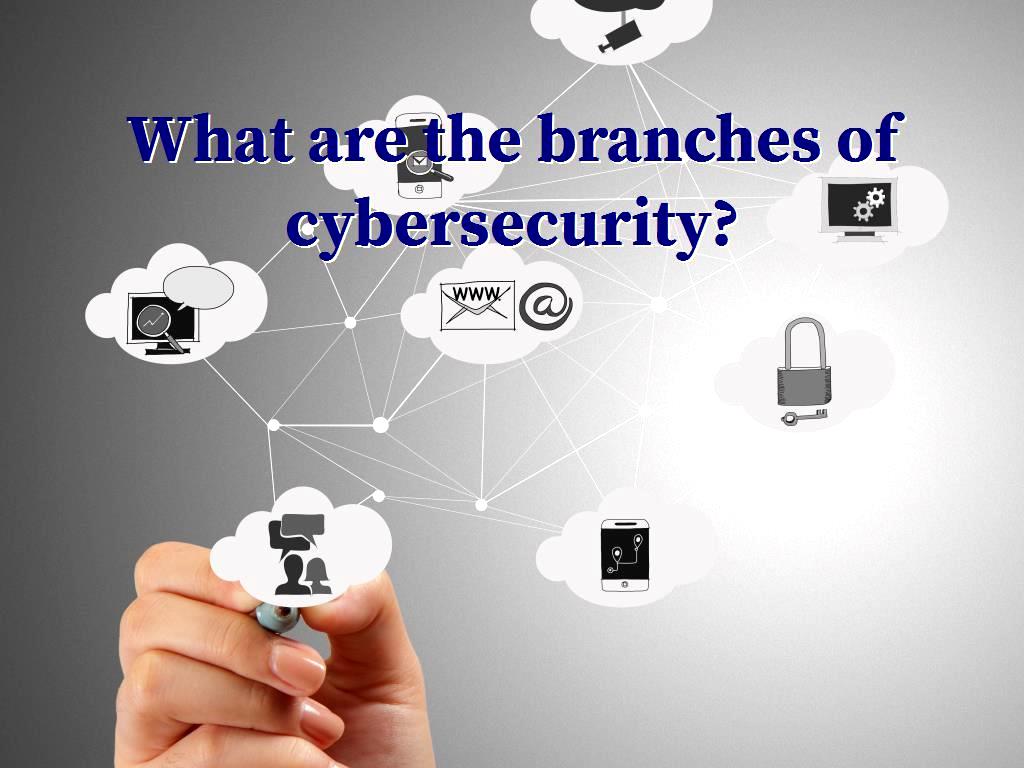What are the branches of cybersecurity?
|
|
8 minute(s) read
|
Published on: Jan 27, 2022
Updated on: Mar 04, 2022
|
You may have heard about cyber security and its uses, but in this article, we first will see a definition of cybersecurity and become familiar with its branches. This article is written to show different types and branches of cybersecurity to you and their uses. So follow this article till the end to find out the information you need about cybersecurity and its branches.

What is CyberSecurity?
Organizations transmit sensitive data over networks and other devices when conducting business, and cybersecurity protects this information and data processing or storage systems by providing a set of hardware and software-related solutions. As the complexity of cyberattacks increases, companies and organizations, especially those tasked with protecting information related to national security, health, or financial records, must take steps to protect sensitive information. Security companies have warned that cyberattacks and digital espionage are the most important threats to countries' security and even used the term terrorism to show how dangerous these threats are.
Cybersecurity means protecting systems, networks, and applications against digital attacks. Cyberattacks aim to access, alter, and destroy important information, receive money from users, and disrupt business processes. Implementing cybersecurity effectively and correctly is one of the challenges in today's world as the number of devices is increasing, and hackers have become more creative. Cybersecurity protects computers, servers, mobile phones, and electronic systems from malicious attacks, and its function can be summarized in the following three phrases:
1. Protection of the devices that people use.
2. Protection of the information that is on these devices.
3. Protection of the identity of the people who are using this information.
The importance of cybersecurity
Cyber threats are growing rapidly, and the number of breaches increases every year. 7.9 billion leaks were only recorded in the first nine months of 2019, which is more than doubled (112%) compared to the same period in 2018. Most breaches are in medical and public services. Cybercrime is mostly about medical and financial information. Also, the businesses that use networks are other targets for accessing their information by attacking their customers using online services. It is estimated that by 2022, about $ 134 billion will be spent on cybersecurity. Governments are responsible for guiding organizations to properly implement cybersecurity against cyber attacks worldwide. By doing a few simple but timely tasks, you can prevent further damage. Cybersecurity should be one of our priorities whether we have a large business or home users who have personal information such as photos and videos. We sometimes make bad decisions without considering the negative and long-term consequences of security.
Cybersecurity is important because the government, military, corporate, financial, and medical organizations collect, process, and store vast amounts of information on computers and other devices.
Types of cyber threats
Threats to cyber security fall into three categories:
1. CyberCrime: An individual or group that targets systems for monetization or sabotage.
2. Cyber Attacks: It is often politically motivated to purposefully gather information.
3. Cyber Terrorism: It aims to intimidate users and those responsible for destroying electronic systems.
Types of cyber security
Cyber security is divided into several subcategories, which we will introduce in the following. Cyber-attacks affect the global economy by about $ 6 million by the end of 2021. Accordingly, various security solutions are available to top cybersecurity companies, all of which are classified into the following subcategories:
- Security of critical infrastructure: Providing cybersecurity for critical infrastructure means protecting communications networks, energy transmission networks, water purifiers, traffic lights, sales terminals, and health centers networks. These centers may not be directly related to cyber attacks, but they can be used as a platform for malware to enter the endpoints of the systems to which they are connected.
- Network Security: Network security protects the computer network from disruptors, malware, or hacking. Network security is a set of solutions that enable organizations to keep computer networks out of the reach of hackers, organized attackers, and malware. For example, organizations use third-party cookies to track users' activities for business growth, but sometimes customers fall victim to this.

Therefore, to deal with cyber-attacks and network-related malware, you should do the following:
- Use the internal network and infrastructure monitoring security program and new technologies such as machine learning to detect abnormal network traffic.
- Limit extra logins to improve network security.
- Develop a schedule for changing passwords regularly.
- Install powerful anti-virus programs.
- Configure firewalls correctly.
- Restrict guest or anonymous access.
- Evaluate incoming traffic from the Internet.
- Use encryption to protect information.
- Improve security by relying on the cloud: Most organizations seek to use artificial intelligence to improve their businesses, enhance their customer experience, and improve performance. Despite the vast amount of data generated by different parts of an organization, which is often unstructured and produced by different sources, organizational networks face a potential threat. Hence, cloud service companies are implementing potential organizations to store and manage this vast amount of data that is prone to security challenges outside of the corporate network by implementing potential security solutions.
- IoT security: Another new security solution is the Internet of Things, which will have a market value of more than $ 520 billion by the end of 2022. Intelligent equipment and sensors interact with the IoT ecosystem to protect commercial equipment in a better way.
- Improve security by relying on security programs: Applications are just as susceptible to cyber-attacks as communication networks, so it is important to use software and hardware solutions such as intrusion detection systems, intrusion prevention systems, firewalls, antivirus, and anti-malware applications to protect your applications.
- Application security: Focuses on maintaining software and devices. Before implementing the device or program, its security must be provided.
- Information security: Protects data integrity and privacy. Information security is done both in storage media and at the time of transferring data.
- Operational security: Includes processes and decisions made to control and protect data. For example, user permissions when accessing the network or processes specify when and where information may be stored or shared.
- User training: Refers to unpredictable aspects of cybersecurity, namely individuals. Anyone can accidentally get a virus into the security system. User training to remove suspicious email attachments, not connecting to anonymous USBs, and other critical issues should be part of any corporate security plan.
The most important points of cyber security
Data leaks that could lead to identity theft and disclosure of sensitive information in public places such as social networks are on the rise. Sensitive information such as social security numbers, credit card information, and bank account details may be stored in cloud storage services such as Darbbox or Google Drive. The fact is that all cyberspace users use and trust computer systems to carry out their daily activities. This makes us more dependent on cloud services, while the hidden weaknesses in cloud services, smartphones, and the Internet are not properly identified. That's why it's important to understand the difference between cybersecurity and information security, even if the technical skills of the two terms are similar. In the last few years, governments have taken cybersecurity more seriously. The GDPR is a great example of what has required organizations operating in the EU to comply with strict EU rules. This approach has succeeded in significantly preventing data breaches. The most important points of cyber security that you should pay special attention to are:
1. Report a data breach.
2. Hire a security expert to protect your information.
3. Obtain permission for business applications that require user data.
4. Anonymize data for privacy.
5. Do not disclose information publicly so that you do not have to answer legal entities.
6. In case of data deficiency, report it to the relevant authorities as soon as possible.
7. Inform all levels of the organization about the dangers of social engineering and common social engineering scams such as phishing emails, typosquatting, and URL Hijacking.
8. Invest in purchasing and using tools that restrict access to information, restrict access by third parties or contractors to corporate information, and continually scan devices, databases, and leaking information.
9. Use long, complex passwords with two-factor or multi-factor authentication to secure access to user accounts. Given that two or more authentication mechanisms use different layers of security to secure access to accounts, if a hacker can accurately guess the password to the account, there is still an additional security step to consider.
Click to audit your website SEO